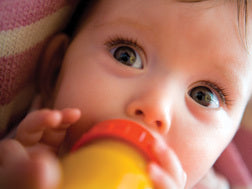Feeding DVD
SKU: BVL33308DVD
- Description
- Extended Description
From the Series: Aspects of Child Development: Fetus to Age 3
The Series Includes : Birth | Feeding | Perception | Bathing | Playing |
Talking
Feeding is about so much more than just food. This program takes a close look at feeding in the first three years-from the breast or baby bottle to the spoon. The program shows many scenes of breast and bottle feeding, as well as the giving of solid food. Mothers, fathers, pediatricians, nutritionists, and child psychologists discuss the bond that feeding creates between children and their parents. In addition, parents and experts provide approaches to weaning and suggestions on appropriate foods.
 Closed Captioned
Closed Captioned
If you are purchasing a 3-Year Streaming option, you will receive a link for your videos via email within 24 - 48 hours. If you are making your order on a weekend, the order will be processed on the next business day.
Length: 54 minutes
Copyright Date: 1999


